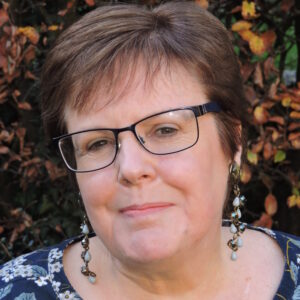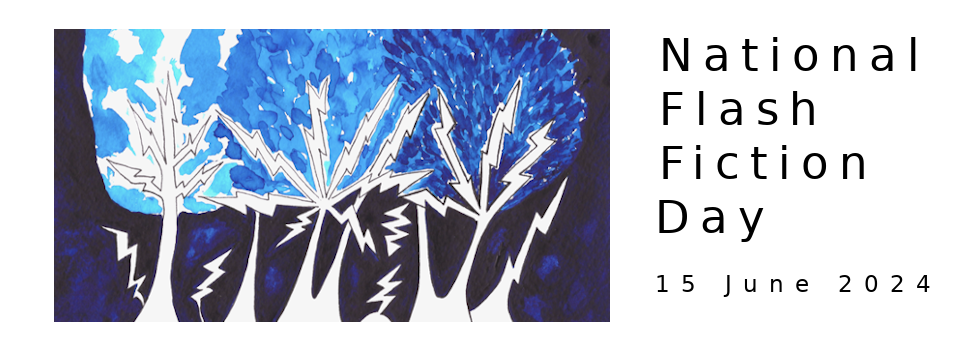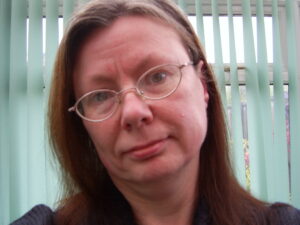Welcome to the seventh and final of our series of interviews with this year's National Flash Fiction Day Anthology Editors and Microfiction Competition Judges! Submissions for the Anthology and Microfiction Competition are open until 15 February 2024.
This week, NFFD's Ingrid Jendrzejewski chats with NFFD's Diane Simmons, the person responsible for administrating the Microfiction Competition year in and year out, about novellas-in-flash, reading techniques, travel, and her experience administrating the competition.
 IJ: For years, you’ve been the mastermind behind the NFFD interview series, coming up with unique, interesting questions for our annual anthology editors and microfiction competition judges. Thank you for allowing me to turn the tables and put you in the hot seat for once!
IJ: For years, you’ve been the mastermind behind the NFFD interview series, coming up with unique, interesting questions for our annual anthology editors and microfiction competition judges. Thank you for allowing me to turn the tables and put you in the hot seat for once!
Every year, you compile the results of the NFFD Microfiction Competition and liaise with the judges to determine the longlist, shortlist and prizewinners. Has this work led to any insights about writing microfiction or judging competitions? Do you have any advice for those who wish to enter the NFFD Microfiction Competition?
DS: I think my main advice (and it’s a bit boring) is to always read the rules. I’ve lost count of the number of times we’ve received entries that were over the word count – not just by a few words, but by hundreds! I also find that quite a few entrants use hyphens when they should have used an en or em dash – this can make a story over the word count. I’m always surprised too when people don’t put the title of the story in the document and I have to search around for it in their email or document name. It’s good to see though that the number of people putting their names/addresses/emails on their entries has decreased to almost nil – it’s always really upsetting to have to disqualify people for this.
With regard to the actual micros, I think that because of the short word count, we quite often get submissions that that are just anecdotes or jokes. Entries too can feel rushed – writing micros isn’t easy and it can often take longer to craft a 100-word story than a 1000-word one.
IJ: Your novella in flash A Tricky Dance was just published this January by Alien Buddha Press. Can you tell us a bit about it?
DS: A Tricky Dance is set in 1970s Scotland and follows spirited teenager Elspeth as she navigates the challenges of friendships, family life and ambition, discovering that even in the face of adversity, life can hold endless possibilities. The novella contains some of my favourite (and most successful) flash fictions and I enjoyed weaving them together to make a longer narrative.
IJ: A Tricky Dance is your third novella in flash, alongside An Inheritance and Finding a Way…and a little bird tells me there are others in the works. What do you like about the novella-in-flash form? What is your process for creating them? Has anything changed about how you view novellas-in-flash as you’ve settled into the form?
DS: I think that writing a NIF is just the greatest fun. I love the challenge of it. When I first came across the form, I was under the impression that each story had to stand on its own two feet and that it should be possible to take a flash out of the novella and read it on its own. I now understand that most people think the form can be a little more flexible than that, but I still enjoy the discipline of trying to make each piece independent, though I have relaxed a little.
The creation process has been different for each of my novellas. An Inheritance was the first novella I wrote. I had a story of 2000 words about a pawned brooch that had won a prize way back in 2010. I had done lots of research on pawnbroking for an Open University module and knew I wanted to write more about it, so I cut down my 2000-word story and used that as the final story in the novella, working backwards until I had my starting point. I mostly wrote new stories for the NIF.
With Finding a Way, I didn’t start off intending to write a NIF, but following the death of my daughter Laura, I wanted to put together a collection of flash fictions on the theme of grief. It was suggested to me by Jude Higgins that these stories could all be connected and it evolved into a collection of connected flash fictions. When it was published by Ad Hoc Fiction, I didn’t call it a NIF, but I would do so if I were publishing it today. Most of the stories were written after my daughter’s death, but a few such as ‘Images’ (first published in the NFFD anthology Scraps) pre-dated that time and I changed them to fit the narrative.
With A Tricky Dance I had quite a few published and prize-winning stories set in Scotland featuring teenagers/children and when I saw the Retreat West Novelette competition a few years ago, I decided it might be fun to put them all together. I changed many of the stories, combined stories and wrote new ones to fill in the gaps. I was pleased when the novella got shortlisted by Retreat West and longlisted by Bath NIF competition and continued working on it on and off for a few years until it was accepted by Alien Buddha.
IJ: Perhaps my first memory of you is being blown away by the way you read your flash at a reading for the Worcestershire LitFest & Fringe’s flash fiction anthology, and to this day, it’s a treat to hear you read your work. Do you have any advice for flash writers who want to read or perform their work?
DS: When I was first asked to read at Worcestershire Lit Fest, I was absolutely terrified and nearly turned down the chance. I googled how to do it and asked lots of writers and received a great deal of advice – too much to write down here, but these are the things I try to follow:
- I think the most important advice is to practise loads. I usually start at least two weeks before I am due to read and I record myself on my phone. When I first started reading stories out loud, I would read to anyone who would listen – it helped take the fear away. Reading to strangers can never be as bad as doing it to people you know.
- Don’t ever read from the book, tablet or phone – print out your story in large print and annotate when you want to take a pause etc. I also learnt that a good idea was to colour code lines of dialogue according to who is speaking.
- Speak slowly – more slowly than seems natural. The audience needs time to take it all in especially if you are reading something funny. Allow time for laughter if necessary.
- Try (although it’s difficult), to look at the audience occasionally while you’re speaking. It’s important to make a connection.
- Unless you are good at dialogue/accents, if you have a choice, read a story without much dialogue.
- You can change a story to make it sound better or clearer when it’s read out. I often add a ‘she says’ or similar, to make it clearer who is reading. If you think you are going to stumble over a word, change it.
- Don’t drink more than one glass of wine before reading (this comes from experience). A good idea is to ask to read early on in the programme. It’s good to get it over with.
IJ: For as long as I’ve known you, you’ve had a caravan and it’s a rare year that we don’t exchange at least a couple logistical NFFD emails whilst you’re on the road. Can you say a bit about what you get out of travel? Does it feed your writing life, or is it something altogether separate?
DS: I’m never happier than when I’m writing in my caravan, preferably with a view of the sea. I find that being in such a small space (and my caravan is VERY small), allows me to concentrate. There are very few chores that need doing and the only other demand on my time is to go out and explore, but as I’m a lazy person, sitting writing with a glass of wine often wins. I do have holidays in the caravan though where I never take out my laptop, but it’s always there just in case.


